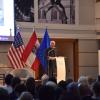
IIASA Cooperation and Transformative Governance Research Group Leader, Nadejda Komendantova, has been appointed as an independent expert on the United Nations Environment Programme’s (UNEP) Foresight Expert Panel established in cooperation with the International Science Council (ISC).
UNEP has partnered with the ISC to advance science-based strategic foresight and futures thinking to enable better preparedness and proactive engagement with future challenges, and to inform and guide decisions for the benefit of the global environment. The Foresight Expert Panel was established to aid in processes to identify and evaluate emerging issues and signals of change, and to guide and oversee this critical work.
As an ISC member and UNEP observer, IIASA was entitled to nominate experts to the panel. Komendantova was selected to the panel comprizing approximately 20 distinguished scholars and specialists across the scientific community representing a wide spectrum of disciplines, training, and cognitive diversity from around the world.
The main responsibilities of the panel include supporting the systematic detection, interpretation, and evaluation of emerging issues and opportunities that can impact the realization of global environmental outcomes; and to provide guidance on bodies of evidence and knowledge to be incorporated, while also contributing to the gathering of new evidence. This will ultimately strengthen UNEP’s capacity to navigate current and future uncertainty and disruptive change, while effectively delivering on its mandate through the establishment of an institutionalized approach to strategic foresight and horizon scanning with a view to developing an anticipatory and future-oriented culture.
The work of the panel will culminate in a global report to be published in 2024. The report, along with the insights and recommendations of the panel will also inform the deliberations of the sixth UN Environment Assembly in February 2024 and the Summit of the Future in September 2024.
Over the years, Komendantova has implemented several projects for the European Commission and for a number of national and international ministries and organizations. She is the lead author of the draft strategy of industrial development of Kyrgyzstan for the United Nations Industrial Development Organisation (UNIDO) and of the handbook on protection of electricity networks from natural hazards for the Organisation for Security and Cooperation in Europe (OSCE). She is also a contributing author to the Global Assessment Report (GAR) and the Global Renewable Energy Report (REN21), as well as the reports of the United Nations Office for Disaster Risk Reduction (UNISDR), the Global Facility for Disaster Reduction and Recovery of the World Bank, the United Nations Economic Commission for Europe (UNECE), and the Organization for Economic Cooperation and Development (OECD). Her extensive experience in governance and decision-making processes under uncertainty, complexity, ambiguity, and volatility, while incorporating systems thinking into strategic policy planning and addressing social dilemmas and wicked policy issues, will be of great benefit to the work of the panel.
IIASA congratulates Komendantova on this appointment and look forward to strengthening ties and continuing collaboration with both UNEP and the ISC.
News

26 July 2024
Navigating new horizons to protect human and planetary health

14 June 2024
IIASA Leadership visits Washington DC

05 June 2024

